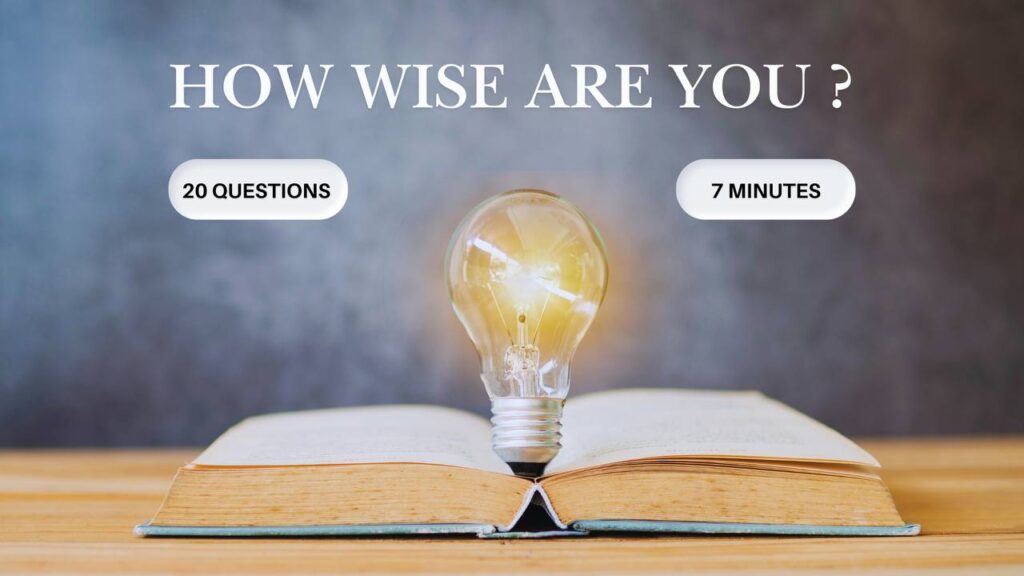
Results
Profound Wisdom
- What This Means: Your responses suggest you exhibit a high level of wisdom in your thoughts and actions.
- Insights:
- Likely demonstrate deep understanding and empathy in complex situations.
- Possess strong self-awareness and make well-balanced decisions.
- Often sought after for advice due to your insightful perspective.
- Next Steps:
- Continue practicing mindfulness and self-reflection to maintain your wisdom.
- Share your knowledge and experiences to mentor others.
- Challenge yourself with new perspectives to further expand your understanding.
Highly Wise
- What This Means: Your responses indicate that you often exhibit wisdom, with room for growth in certain areas.
- Insights:
- Tend to make thoughtful decisions based on a combination of logic and empathy.
- Can effectively navigate challenges with a balanced approach.
- Recognize the importance of learning from experiences.
- Next Steps:
- Reflect on situations where you could apply deeper self-awareness.
- Strengthen your ability to understand and integrate diverse perspectives.
- Focus on cultivating patience and open-mindedness in challenging situations.
Balanced Wisdom
- What This Means: Your responses suggest a balanced approach to wisdom, with consistent but not profound tendencies.
- Insights:
- Capable of making reasonable and empathetic decisions in familiar situations.
- Open to growth but may occasionally overlook opportunities for deeper insight.
- Maintain a steady perspective without overthinking.
- Next Steps:
- Explore deeper self-reflection to strengthen your decision-making skills.
- Actively seek feedback to broaden your understanding of complex issues.
- Engage in activities that encourage critical thinking and emotional growth.
Developing Wisdom
- What This Means: Your responses indicate emerging wisdom, with opportunities to strengthen your insight and judgment.
- Insights:
- May rely on gut instincts or external advice rather than deep reflection.
- Tend to focus on immediate outcomes rather than long-term implications.
- Recognize the value of growth but need more practice in applying wisdom.
- Next Steps:
- Engage in regular self-reflection to understand your patterns of thought.
- Read and learn from individuals who demonstrate wisdom and resilience.
- Practice empathy by putting yourself in others’ shoes during decision-making.
Emerging Awareness
- What This Means: Your responses suggest limited engagement with wisdom-driven behavior, with significant room for growth.
- Insights:
- Likely focus more on immediate reactions than thoughtful consideration.
- Struggle to see the broader perspective in challenging situations.
- May overlook the value of reflection and empathy in decision-making.
- Next Steps:
- Start small by reflecting on daily decisions and their outcomes.
- Seek guidance from mentors or role models who embody wisdom.
- Cultivate mindfulness and patience to develop deeper insights over time.
#1. I can learn something from everyone I meet.
#2. I have trouble thinking clearly when I get upset.
#3. Humor can be found even in very difficult situations.
#4. I enjoy learning things about other cultures.
#5. My happiness does not depend on other people and things.
#6. I can accept myself, faults and all.
#7. I don’t mind when people disagree or argue with me.
#8. I wonder about the meaning of life and what lies beyond it.
#9. I often look for new things to try.
#10. In a complicated world, the only way to know what’s going on is to rely on leaders we can trust.
#11. There is usually more than one right way to do anything.
#12. No one is completely good or bad.
#13. A problem doesn’t need to have a solution for it to interest me.
#14. I’m willing to take time to figure out why things turned out the way they did.
#15. When I look back on my life, I can’t help feeling resentful.
#16. I don’t worry about other people’s opinions of me.
#17. here are some people I just know I’d never like.
#18. I feel like I’m part of something greater than myself.
#19. I don’t mind making fun of myself if it makes someone else feel better.
#20. When I’m upset at someone, I try to put myself in his or her shoes for a while.
Previous
Finish


